-contain-250x120.jpg)
Innovative plastic mulch alternative set to increase crop water productivity by 30%
CSIRO’s latest invention, TranspiratiONal, a spray-on polymer membrane will help farmers increase crop yield and save water, but with fewer inputs and less environmental impact.
Farmers across the world have used plastic mulch films to intensify crop production since the 1960s. Applying a thin plastic film to rows of crops has proven short-term benefits, boosting yields by moderating soil temperature, maintaining soil moisture and reducing weed competition. TranspiratiONal, a Sprayable Biodegradable Polymer Membrane (SBPM) technology is CSIRO’s response to this global challenge.
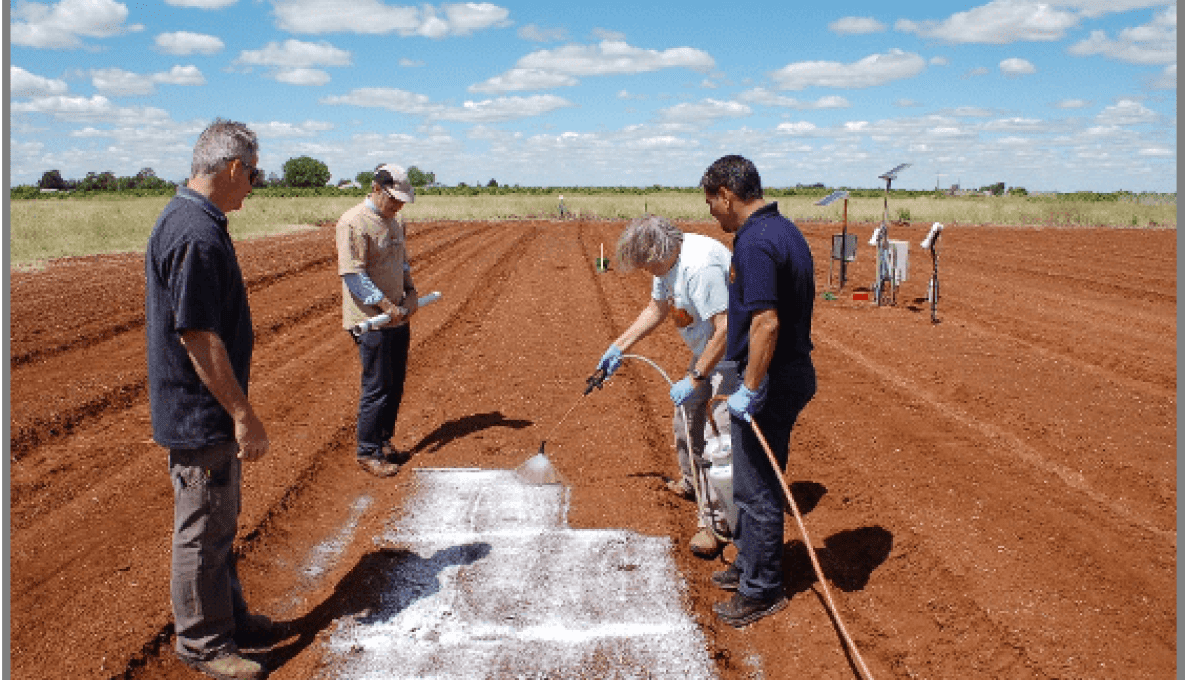
CSIRO’s latest invention, TranspiratiONal, a spray-on polymer membrane will help farmers increase crop yield and save water, but with fewer inputs and less environmental impact.
With experts predicting we’ll need to feed and clothe 9.7 billion people by 2050, agricultural production must undergo a radical transformation. CSIRO has developed a game-changing update to a decades-old technology that will enable the sustainable intensification needed to produce more food with less resources.
TranspiratiONal, a Sprayable Biodegradable Polymer Membrane (SBPM) technology is CSIRO’s response to this global challenge.
“The technology delivers the benefits of plastic mulch films, but without the environmental cost,” said CSIRO Senior Principal Research Scientist Dr Keith Bristow, who is leading the project.
RELATED: Human-like robotics to save time and food waste
“The world desperately needs a durable, cost-effective sprayable biodegradable polymer membrane technology to replace the petroleum-based plastic mulch films that are damaging our soils, water systems and cropping systems,” explained Keith.
Farmers across the world have used plastic mulch films to intensify crop production since the 1960s. Applying a thin plastic film to rows of crops has proven short-term benefits, boosting yields by moderating soil temperature, maintaining soil moisture and reducing weed competition.
Related organisations
-contain-250x120.jpg)
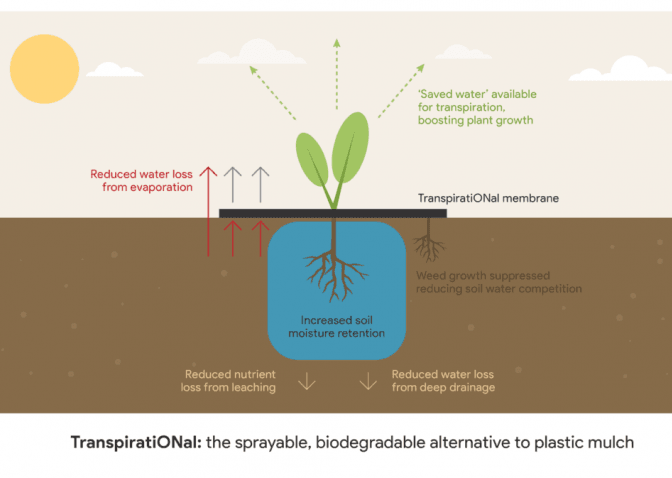
Plasticulture
A short-term fix with long-term consequences
CSIRO estimates 10 million tonnes of plastic mulch film is used globally in agriculture each year. China, the United States and Australia account for more than half of this. And usage is growing, with the global market predicted to reach USD 14.31 billion by 2026.
But the downsides are significant – to the farmer and the planet. Application is specialised, costly and typically one-size-fits-all. And the plastic mulch must be retrieved and disposed of at the end of the growing season, to protect soils and water systems as best we can.
Essentially it’s single-use plastic on a massive scale, as used films are often torn, partly degraded, and contaminated with soil and agrochemicals, so trying to recycle the waste is costly. This means, most are burned or sent to landfill. But plastic mulches present challenges during use, too.
CSIRO Senior Scientist, Stuart Gordon said, “Serious contamination and soil toxicity issues from plastic mulch films have already led to enforceable regulations in Europe and the rest of the world is not far behind.”
The CSIRO team believe TranspiratiONal is a worthy solution, and it’s ready to be commercialised.
“The SBPM Technology is a water-based polyurethane dispersion that forms a membrane when sprayed onto the soil, which will disintegrate and biodegrade, leaving no toxic residue in the soil,” explained Stuart.
“There is also the potential to be able to formulate the dispersion so the integrity of the membrane can be extended as required.”
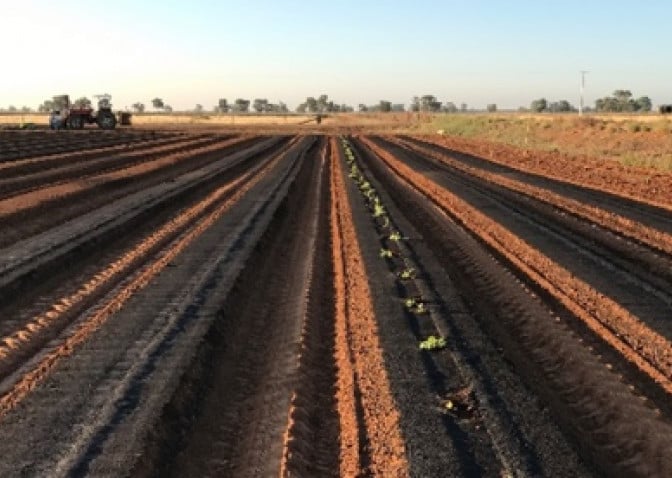
Field trials
Massive benefits for crop water productivity proven
Peer-reviewed irrigated field trials, carried out between 2015 and 2018, on cotton, sorghum, tomatoes and melons, confirmed a more than 30% increase in water productivity compared with bare soil treatments – as well as weed suppression.
Achieving CSIRO’s initial target of using 10% less water with no yield loss in Australian irrigated agriculture would free up more than 1,000 gigalitres of water for growing additional crops or improving environmental flows. The potential is great, as even this conservative 10% improvement would deliver nearly one-third of the total volume of water to be recovered under the Murray-Darling Basin Plan.
Did you know?
Biodegradable polymers are a special class of polymers which, once they’ve served their purpose, are broken down by bacterial decomposition. They leave behind only natural by-products such as gases (CO2, N2), water, biomass, and inorganic salts.

Spray-on polymer
A cost-effective and flexible alternative to plastic mulch films
While water-saving benefits are seen when using plastic mulch films, TranspiratiONal offers the farmer advantages, which plastic can’t. CSIRO is aiming to reach price-parity with plastic, but with retrieval and disposal costs removed, TranspiratiONal should come out on top.
Farmers can use hand-held or mechanised sprayers and adjust the spray to cover the soil surface required for different cropping systems.
“Field trials have even shown potential to adjust the application by spraying onto the soil and up onto the stems of seedlings to create a complete soil coverage that eliminates weed growth, with no adverse impact on the seedlings,” said Keith.
Alternatives to conventional plastic mulch films are available but haven’t yet been widely adopted. The team believes this is largely because they don’t match the CSIRO product for sprayability, biodegradability, and ease of use.
Image: CSIRO Scientist, Keith Bristow
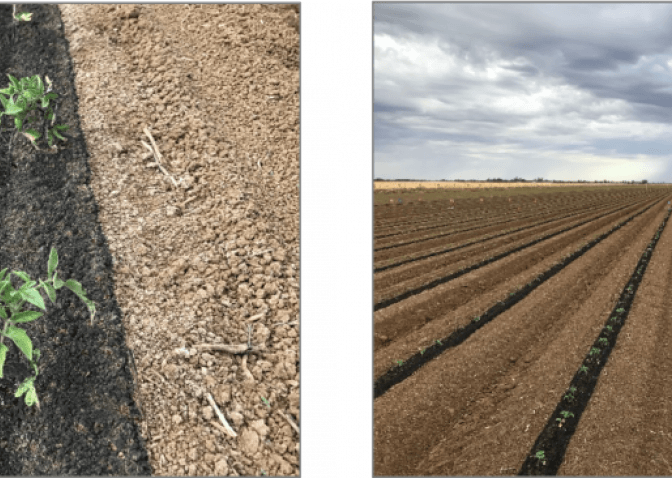
Sweet investment opportunity to fine-tune formula
CSIRO is well-versed in the ‘Science to Seed’ game and they’ve done the hard work on TranspiratiONal. They’ve conducted commercial trials, secured IP through three patents, lined up formulation and manufacturing partners, established a commercialisation team, and have multi-national and local customers ready to go.
The next step is to fine-tune the formula and application rates to balance biodegradability with durability – maximising the benefit for the range of cropping systems it can assist.
For a like-minded partner, it is a great investment opportunity.
TranspiratiONal recently earned the THRIVE AgriFoods’ People’s Choice Award for Australia. Backed by SVG Ventures and headquartered in Silicon Valley, THRIVE is considered the world’s leading AgriFood investment and innovation platform. The win gives the product priceless exposure.
The TranspiratiONal team has also carried out more than 200 customer and end-user interviews, confirming strong demand for the technology both in Australia and abroad.
“We’ve also had interest from broadacre farmers,” said Keith, who are traditionally excluded from the plastic mulch market.
The potential for other agricultural applications will pique investor interest, too. While the CSIRO team has been focused on developing the product as a mulch alternative, the polyurethane formulation could be tweaked to replace plastics in other agricultural uses, such as a manure cover.
“The stars are aligning,” explained Stuart, with growing demand for the product and clear benefits for cropping production systems.
To learn more about this investment opportunity, please contact the growAG team.
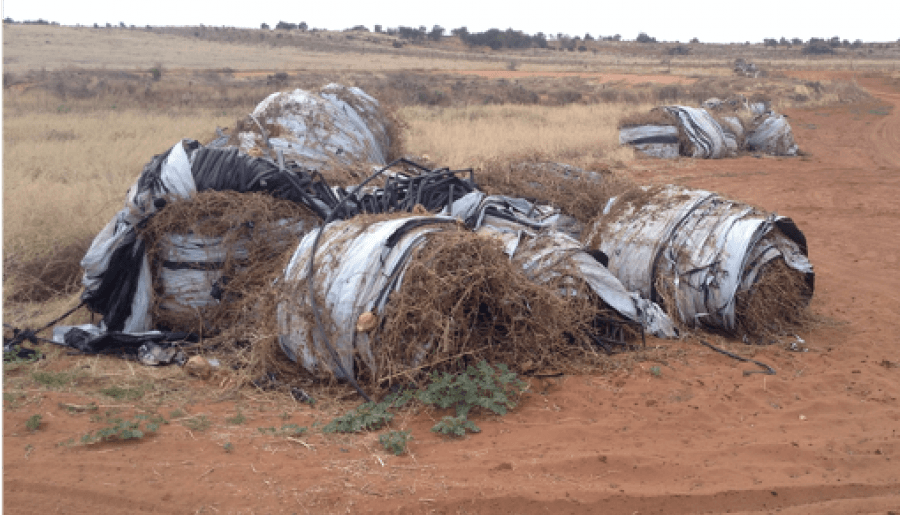
THRIVE Challenge 2020
TranspiratiONal pitch
-crop-850x675.png)
Looking for engagement?
Showcase your commercialisation opportunity today.
Talk to our team to discuss how growAG. can connect your innovation to industry.
Have questions? Find answers to our most frequently asked questions on research projects, commercial opportunities, organisations and more.
